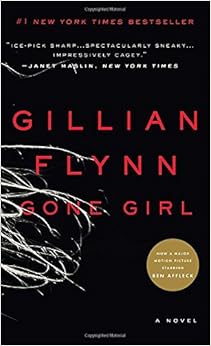Nothing I want to say about Gone Girl can be said without spoilers, so on the off chance that anybody reading this post has been slower than me to read Gone Girl, and cares about spoilers, begone with you! (Instead of reading this post, you should go read Ana’s post about books where The Twist dominates conversations about the book. Not apropos of anything! Not being pointed! Just an interesting read!)

Okay! If you didn’t want to be spoiled, I hope you have stopped reading! I am going to say spoilers now!
Now I’m going to say them.
Right now.
(I’m doing additional precautions because I was out having yogurt with my parents, and my mother got upset with me for revealing something that you find out about the middle of Gone Girl. Sorry, Mumsy! But to be fair, you always want me to tell you what happens in books. I had no way of knowing that this one was different.)
When you know from the beginning — as I did — that Amy is a crazy person who’s framing her husband for her own murder as revenge for his cheating on her, the first half of Gone Girl reads like a “Can This Marriage Be Saved” column for sociopaths. In alternating chapters, Nick tells us about being the husband of a woman who has disappeared, and Amy tells us about meeting Nick and falling in love with him. Knowing that Amy is deliberately crafting the persona of a woman who gradually comes to fear her husband made this a particular joy to read. It’s so fun to see all the traps that have been laid for Nick, how guilty he looks, even to the reader, even though we’re inside his head. It’s like a British sitcom — but creepy — where the situation spirals further and further out of control with every passing minute, until we get a reset (the sitcom episode ends; Amy comes back).
In the second half of the book, we have the fun of seeing Amy get herself into difficulties and then wriggle back out of them. I’ve seen some reviews of Gone Girl that complained about the apparent inconsistency of Amy being set up as this disturbingly brilliant woman and then getting screwed over by a couple of low-level criminals in the middle of the book. I had just the opposite reaction: it seemed completely in keeping with the character. Amy’s a planner, not an improviser. She’s a master of the long con, taking established patterns and turning them to her advantage, but she’s terrible at thinking fast on her feet.
(Full disclosure: I overidentified with that aspect of Amy’s character. I am excellent at planning schemes, but I, too, do not do well with sudden bumps in the road.)
And sure, Amy’s a cartoonish villain. But she’s not cartoonish because she’s too smart; she’s cartoonish because she’s evil, and her sociopathy is crazy fun to read about. I didn’t care about the improbability of the twists and turns, or about the too-pat psychology of a girl whose parents fictionalized her life growing up to have no clear identity of her own. It was just too fun a book to worry about any of that.
I’m kinda psyched for this movie. At first I thought they were casting Ben Affleck just cause he’s famous, but I now realize that it is a piece of absolutely perfect casting. If you had asked me, “Who’s that movie star who has a face you want to punch, and like, he’s an Irish working-class kid in the body of a total trust-fund douchebag?” (which is how Nick describes himself), I’d have said, “I dunno, Ben Affleck maybe?” Way to go, casting directors. Way to earn your keep.